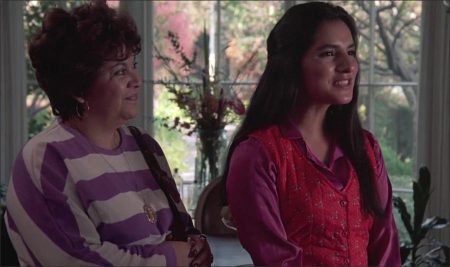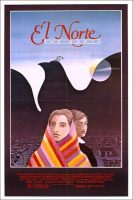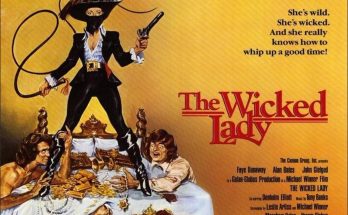Taglines: The magical film that reveals the world between the dream and the reality.
El Norte movie storyline. Mayan Indian peasants, tired of being thought of as nothing more than “brazos fuertes” (“strong arms”, i.e., manual laborers) and organizing in an effort to improve their lot in life, are discovered by the Guatemalan army. After the army destroys their village and family, a brother and sister, teenagers who just barely escaped the massacre, decide they must flee to “El Norte” (“the North”, i.e., the USA).
After receiving clandestine help from friends and humorous advice from a veteran immigrant on strategies for traveling through Mexico, they make their way by truck, bus and other means to Los Angeles, where they try to make a new life as young, and undocumented immigrants.
El Norte is a 1983 British-American low-budget independent drama film, directed by Gregory Nava. The screenplay was written by Gregory Nava and Anna Thomas, based on Nava’s story. The movie was first presented at the Telluride Film Festival in 1983, and its wide release was in January 1984.
The picture was partly funded by the Public Broadcasting Service (PBS), a non-profit public broadcasting television service in the United States. El Norte received an Oscar nomination for Best Original Screenplay in 1985, the first American independent film to be so honored. In 1995, the film was selected for preservation in the United States National Film Registry by the Library of Congress as being “culturally, historically, or aesthetically significant”.
The drama features Zaide Silvia Gutiérrez and David Villalpando, in their first film roles, as two indigenous youths who flee Guatemala in the early 1980s due to the ethnic and political persecution of the Guatemalan Civil War. They head north and travel through Mexico to the United States, arriving in Los Angeles, California, after an arduous journey.
About the Story
The writing team of Nava and Thomas split the story into three parts:
Arturo Xuncax:
The first part takes place in a small rural Guatemalan village called San Pedro and introduces the Xuncax family, a group of indigenous Mayans. Arturo is a coffee picker and his wife a homemaker. Arturo explains to his son, Enrique, his world view and how the indio fares in Guatemalan life, noting that, “to the rich, the peasant is just a pair of strong arms”. Arturo and his family then discuss the possibility of going to the United States where “all the people, even the poor, own their own cars”.
Because of his attempts to form a labor union among the workers, Arturo and the other organizers are attacked and murdered by government troops when a co-worker is bribed to betray them—Arturo’s severed head is seen hanging from a tree. When Enrique attempts to climb the tree that displays his father’s head, a soldier attacks him. Enrique fights and kills the attacker, only to learn that many of their fellow villagers have been rounded up by soldiers. The children’s mother too “disappears”: abducted by soldiers. So, using money given to them by their godmother, Enrique and his sister Rosa decide to flee Guatemala, the land of their birth, and head north.
Coyote:
During the second part of the film the two teenagers flee Guatemala, travel through Mexico, and meet a Mexican coyote who guides them across the border. This section includes various comic scenes relating to mutual stereotyping among different ethnic groups; the two attempt to pass themselves off as indigenous Mexicans, failing to convince one Mexican truck driver after naming the wrong destination, but later succeeding in convincing a U.S. Border Patrol officer by copiously peppering their responses with the Mexican word for “fuck”, which a neighbor had suggested was how all Mexicans speak. After their first failed attempt to cross the “frontera”, where a man posing as a coyote deceives and attempts to rob them, they have a horrific experience when they finally cross the U.S.-Mexican border through a sewer pipe laden with rats; critic Roger Ebert noted:
El Norte:
In the final part of the film Rosa and Enrique discover the difficulties of living in the U.S. without official documentation. The brother and sister team find work and a place to live and initially feel good about their decision. However, Rosa nearly is caught up in an immigration raid and must find a new job. Working as a domestic, she is puzzled when her Anglo employer shows her a washing machine.
Enrique becomes a busboy and, as his English classes begin to improve his command of the language, he is promoted to a position as a waiter’s assistant. He is later approached by a businesswoman who has a better-paying job for him in Chicago as a foreman, which he initially declines; he too encounters problems when a jealous Chicano co-worker reports him to immigration, causing him to flee the restaurant and seek out the businesswoman.
When Enrique finally decides to take the position, Rosa becomes gravely ill with typhus contracted from the rat bites she received during their border crossing. When this happens, Enrique must make the tough decision of missing the flight to Chicago to be by her side, and thus loses the position. As Enrique visits the hospital, Rosa laments that she will not live to enjoy the fruits of their harrowing journey to the U.S.
El Norte (1983)
Directed by: Gregory Nava
Starring: Zaide Silvia Gutiérrez, David Villalpando, Ernesto Gómez Cruz, Alicia del Lago, Mike Gomez, Jose Martin Ruano, Stella Quan
Screenplay by: Anna Thomas
Cinematography by: James Glennon
Film Editing by: Betsy Blankett Milicevic
Costume Design by: Hilary Wright
Music by: The Folkloristas
Distributed by: Cinecom International, PBS
Release Date: November 10, 1983
Visits: 170




